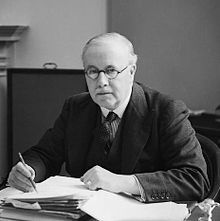Kingsley Wood
|
The Right Honourable Sir Kingsley Wood |
|
|---|---|
 |
|
| Chancellor of the Exchequer | |
|
In office 12 May 1940 – 21 September 1943 |
|
| Prime Minister | Winston Churchill |
| Preceded by | Sir John Simon |
| Succeeded by | Sir John Anderson |
| Lord Privy Seal | |
|
In office 3 April 1940 – 12 May 1940 |
|
| Prime Minister | Neville Chamberlain |
| Preceded by | Samuel Hoare |
| Succeeded by | Clement Attlee |
| Secretary of State for Air | |
|
In office 16 May 1938 – 3 April 1940 |
|
| Prime Minister | Neville Chamberlain |
| Preceded by | Philip Cunliffe-Lister |
| Succeeded by | Archibald Sinclair |
| Minister of Health | |
|
In office 7 June 1935 – 16 May 1938 |
|
| Prime Minister |
Stanley Baldwin Neville Chamberlain |
| Preceded by | Hilton Young |
| Succeeded by | Walter Elliot |
| Postmaster General | |
|
In office 25 August 1931 – 7 June 1935 |
|
| Prime Minister |
Ramsay MacDonald Stanley Baldwin |
| Preceded by | William Ormsby-Gore |
| Succeeded by | George Tryon |
|
Member of Parliament for Woolwich West |
|
|
In office 14 December 1918 – 21 September 1943 |
|
| Preceded by | Office Created |
| Succeeded by | Francis Beech |
| Personal details | |
| Born | 19 August 1881 |
| Died | 21 September 1943 (aged 62) |
| Political party | Conservative |
Sir Howard Kingsley Wood (19 August 1881 – 21 September 1943) was an English Conservative politician. The son of a Wesleyan Methodist minister, he qualified as a solicitor, and successfully specialised in industrial insurance. He became a member of the London County Council and then a Member of Parliament.
Wood served as junior minister to Neville Chamberlain at the Ministry of Health, establishing a close personal and political alliance. His first cabinet post was Postmaster General, in which he transformed the British Post Office from a bureaucracy to a business. As Secretary of State for Air in the months before the Second World War he oversaw a huge increase in the production of warplanes to bring Britain up to parity with Germany. When Winston Churchill became Prime Minister in 1940, Wood was made Chancellor of the Exchequer, in which post he adopted policies propounded by John Maynard Keynes, changing the role of HM Treasury from custodian of government income and expenditure to steering the entire British economy.
One of Wood's last innovations was the creation of Pay As You Earn, under which income tax is deducted from employees' current pay, rather than being collected retrospectively. This system remains in force in Britain. Wood died suddenly on the day on which the new system was to be announced to Parliament.
Wood was born in Hull, eldest of three children of the Rev. Arthur Wood, a Wesleyan Methodist minister, and his wife, Harriett Siddons, née Howard. His father was appointed to be minister of Wesley's Chapel in London, where Wood grew up, attending nearby Central Foundation Boys' School. He was articled to a solicitor, qualifying in 1903 with honours in his law examinations.
...
Wikipedia
